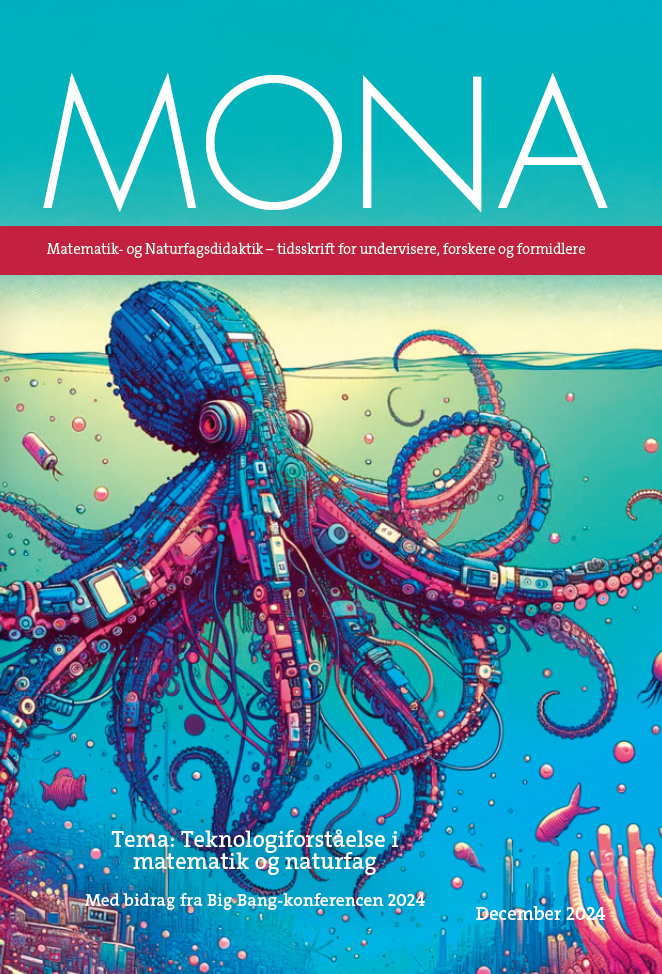Resumé
I denne artikel rapporterer vi fra en spørgeskemaundersøgelse hvor vi dokumenterer at en stor andel af de adspurgte teknologiinteresserede danske matematiklærere allerede nu underviser i programmering og computational thinking, på trods af at de ikke oplever at have de faglige forudsætninger eller den organisatoriske støtte til at udføre arbejdet. Artiklens empiriske grundlag udgøres af besvarelser fra 73 teknologiinteresserede danske matematiklærere indsamlet i januar-april 2022. Omkring to tredjedele af disse adspurgte lærere rapporterer at de underviser i CT-praksisser, mens kun 10,5% af dem mener at have de nødvendige kompetencer til det. Den adspurgte population, som må forventes at udgøres af særlig interesserede matematiklærere, finder således både vilje og en oplevelse af meningsfuldhed i arbejdet med CT i matematikundervisningen, men mangler kompetencer og en struktureret tilgang til kapacitetsopbygning. Særligt sidstnævnte forventer vi derfor i endnu højere grad må gælde den brede population af danske matematiklærere.
Referencer
Bocconi, S., Chioccariello, A., Kampylis, P., Dagienė, V., Wastiau, P., Engelhardt, K., Earp, J., Horvath, M., Jasutė, E., Malagoli, C., Masiulionytė-Dagienė, V. & Stupurienė, G. (2022). Reviewing computational thinking in compulsory education: State of play and practices from computing education. Publications Office of the European Union. https://doi.org/10.2760/126955
Bower, M., & Falkner, K. (2015). Computational thinking, the notional machine, pre-service teachers, and research opportunities. In Proceedings of the 17th Australasian computing education conference (ACE 2015) (Vol. 27, p. 30). Australian Computer Society.
Bråting, K. & Kilhamn, C. (2021). The integration of programming in Swedish school mathematics: Investigating elementary mathematics textbooks. Scandinavian Journal of Educational Research, 66(4), 594‑609. https://doi.org/10.1080/00313831.2021.1897879
Børne- og Undervisningsministeriet. (2021). Forsøg med teknologiforståelse i folkeskolens obligatoriske undervisning – slutevaluering. https://www.uvm.dk/-/media/filer/uvm/aktuelt/pdf21/okt/211004-slutevaluering-teknologoforstaaelse.pdf
Cabrera, L. (2019). Teacher preconceptions of computational thinking: A systematic literature review. Journal of Technology and Teacher Education, 27(3), 305‑333.
Clements, D. H., & Sarama, J. (1997). Research on Logo: A decade of progress. Computers in the Schools, 14(1‑2), 9‑46. https://doi.org/10.1300/J025v14n01_02
Elicer, R., Tamborg, A. L., Bråting, K. & Kilhamn, C. (2023). Comparing the integration of programming and computational thinking into Danish and Swedish elementary mathematics curriculum resources. International Journal on Math, Science and Technology Education, 11(3), 77‑102. https://doi.org/10.31129/LUMAT.11.3.1940
Gadanidis, G., Hughes, J., Minniti, L. & White, B. (2017). Computational thinking, grade 1 students and the binomial theorem. Digital Experience in Mathematics Education, 3(2), 77‑96. https://doi.org/10.1007/s40751‑016‑0019‑3
Kallia, M., van Borkulo, S. P., Drijvers, P., Barendsen, E. & Tolboom, J. (2021). Characterising computational thinking in mathematics education: A literature-informed Delphi study. Research in Mathematics Education, 23(2), 159‑187. https://doi.org/10.1080/14794802.2020.1852104
Misfeldt, M., Szabo, A., & Helenius, O. (2019). Surveying teachers’ conception of programming as a mathematics topic following the implementation of a new mathematics curriculum. Proceedings the Eleventh Congress of the European Society for Research in Mathematics Education, 2713‑2720, Freudenthal Group, Freudenthal Institute, ERME.
Niss, M. & Højgaard, T. (2019). Mathematical competencies revisited. Educational Studies in Mathematics, 102(1), 9‑28. https://doi.org/10.1007/s10649‑019‑09903‑9
Noss, R. (1986). Constructing a conceptual framework for elementary algebra through Logo programming. Educational Studies in Mathematics, 17(4), 335‑357. https://doi.org/10.1007/BF00311324
Noss, R. (1987). How do children do mathematics with LOGO? Journal of Computer Assisted Learning, 3(1), 2‑12. https://doi.org/10.1111/j.1365‑2729.1987.tb00303.x
Noss, R. & Hoyles, C. (1996). Windows on mathematical meanings: Learning cultures and computers. Kluwer.
OECD. (2018). PISA 2022 Mathematics framework (draft). https://pisa2022-maths.oecd.org/files/PISA%202022%20Mathematics%20Framework%20Draft.pdf
Papert, S. (1980). Mindstorms: Children, computers, and powerful ideas. Basic Books.
Pérez, A. (2018). A framework for computational thinking dispositions in mathematics education. Journal for Research in Mathematics Education, 49(4), 424‑461. https://doi.org/10.5951/jresematheduc.49.4.0424
Regeringen. (2023). Danmarks Digitaliseringsstrategi – ansvar for den digitale udvikling. https://digmin.dk/Media/638357207253210400/SVM%20regeringen_Danmarks%20digitaliseringsstrategi_2023_V9_Online_Final%20(1)-a.pdf
Tamborg, A. L., Elicer, R., Bråting, K., Geraniou, E., Jankvist, U. T. & Misfeldt, M. (2023). The politics of computational thinking and programming in mathematics education: Comparing curricula and resources in England, Sweden and Denmark. I B. Pepin, G. Gueudet & J. Choppin (red.), Handbook of digital resources in mathematics education (s. 1‑27). Springer. https://doi.org/10.1007/978‑3‑030‑95060‑6_55‑1
Tamborg, A. L., Nøhr, L. & Misfeldt, M. (2022). Towards designing a comparative survey for implementing PCT in Danish, Swedish, and English K-9 mathematics education. I J. Hodgen, E. Geraniou, G. Bolondi & F. Federica (red.), Proceedings of the Twelfth Congress of European Research Society in Mathematics Education (CERME12) (s. 4197‑4204). Free University of Bozen-Bolzano. https://hal.science/CERME12/hal-03766214v1
Weintrop, D., Beheshti, E., Horn, M., Orton, K., Jona, K., Trouille, L. & Wilensky, U. (2016). Defining computational thinking for mathematics and science classrooms. Journal of Science Education and Technology, 25(1), 127‑147. https://doi.org/10.1007/s10956‑015‑9581‑5
Wing, J. M. (2006). Computational thinking. Communications of the ACM, 49(3), 33‑35. https://doi.org/10.1145/1118178.1118215
Yadav, A., Mayfield, C., Zhou, N., Hambrusch, S., & Korb, J. T. (2014). Computational thinking in elementary and secondary teacher education. ACM Transactions on Computing Education (TOCE), 14(1), 1‑16. http://dx.doi.org/10.1145/2576872

